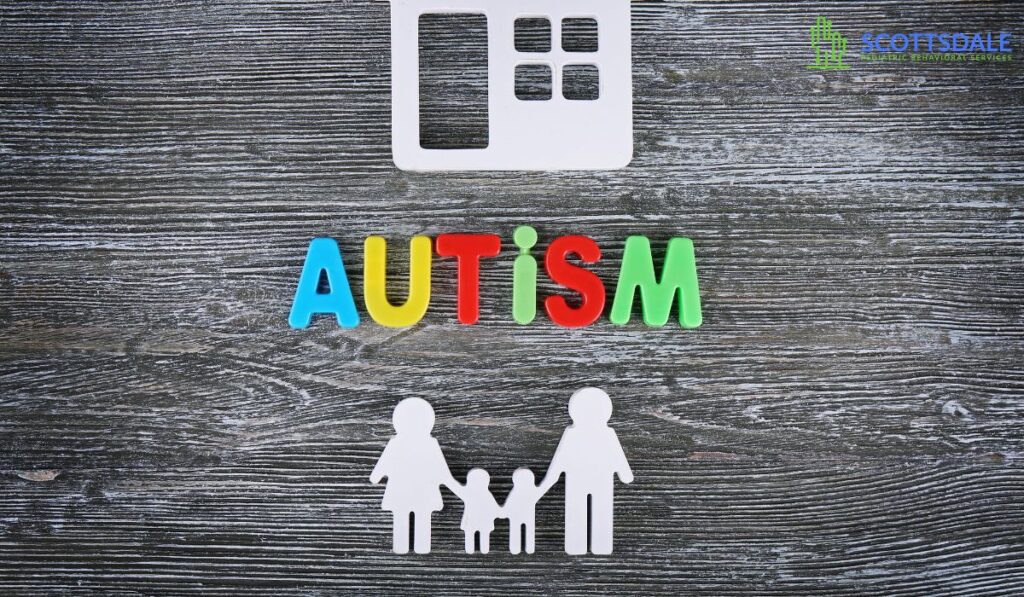Self-Care for Parents: Managing Stress and Burnout While Raising a Child with Autism
Caring for a child with autism, like Parent Self-Care for Autism, demands extra support and strategies.
Raising a child with autism can intensify these challenges.
The unique needs and daily demands of children with autism can lead to increased parental stress and burnout.
This blog explores the vital role of self-care for parents raising children with autism and offers actionable tips to manage stress and uphold well-being.
The Importance of Self-Care for Parents
Raising a child with autism can be both emotionally and physically demanding.
The constant juggling of therapies, appointments, and daily routines can take a toll on your mental and physical health.
Therefore, it’s crucial for parents to prioritize self-care to prevent burnout.
Here are some reasons why self-care is essential for parents of children with autism:
Emotional Resilience:
Parenting, in general, comes with its fair share of emotional challenges.
When you add the complexity of raising a child with autism, these challenges can become even more pronounced.
Self-care practices, such as mindfulness and stress reduction techniques, can help parents develop emotional resilience.
Such resilience helps you recover from challenging times and stay emotionally balanced throughout the journey of parenting a child with autism.
Improved Mental Health:
The stress and demands of parenting a child with autism can take a toll on your mental health. Parents often experience heightened levels of anxiety and depression.
Engaging in self-care activities can alleviate these symptoms by reducing stress and anxiety.
Prioritizing your mental health ensures that you are better equipped to provide the support and care your child needs.
Enhanced Parent-Child Relationship:
Self-care benefits not just you, but also your child.
When you practice self-care, you are better able to engage with your child in a positive and nurturing manner.
Reduced stress levels and improved emotional well-being mean you can be more patient, understanding, and attentive to your child’s needs.
This can significantly enhance the parent-child relationship and foster a sense of security and trust.
Modeling Healthy Behavior:
Children often learn by example. When you prioritize self-care and demonstrate that it’s okay to take time for oneself, you’re teaching your child a valuable life lesson.
You demonstrate that self-care is crucial to overall well-being and that seeking help when necessary is okay.
This can positively impact your child’s future approach to self-care and mental health.
Preventing Burnout:
Parenting a child with autism can be a 24/7 responsibility. Without self-care, the risk of parental burnout increases significantly.
Burnout can manifest as physical exhaustion, emotional depletion, and reduced ability to provide effective care.
By engaging in self-care practices, you can prevent burnout, ensuring that you can continue to meet your child’s needs with energy and enthusiasm.
In essence, self-care is not a luxury but a necessity for parents of children with autism.
It’s a means of equipping yourself with the emotional strength, mental clarity, and physical energy required to navigate the unique challenges and joys of raising a child with autism effectively.
By investing in self-care, you’re not only taking care of yourself but also creating a healthier and more supportive environment for your child to thrive.
Practical Self-Care Suggestions
Now that we’ve established the importance of self-care for parents of children with autism, let’s delve into some practical self-care suggestions:
Prioritize Sleep:
Adequate sleep is the foundation of self-care.
Establish a consistent bedtime routine for both you and your child.
Ensure that your child’s sleep environment is comfortable and conducive to rest.
Prioritizing sleep quality and quantity will improve your overall well-being and resilience.
Seek Support:
Connecting with others who understand the challenges you face can be incredibly comforting and empowering.
Look for support groups, either in your local community or online, where you can share your experiences, exchange advice, and gain emotional support from people who are going through similar journeys.
Schedule “Me Time”:
Make a commitment to allocate dedicated “me time” in your weekly schedule.
Treat this time as non-negotiable, just like any other appointment. During this time, engage in activities that bring you joy, whether it’s reading, pursuing a hobby, or simply enjoying a peaceful moment to yourself.
Delegate Tasks When Possible:
Don’t hesitate to ask for help from family members, friends, or professional caregivers when needed.
Delegating tasks like childcare or household chores can provide you with valuable breaks and support, reducing your overall stress levels.
Maintain Healthy Eating Habits:
Nutrition plays a vital role in your physical and mental well-being.
Aim for a balanced diet rich in fruits, vegetables, lean proteins, and whole grains.
Proper nutrition can provide the energy and nutrients necessary to sustain you through the demands of parenting.
Exercise Regularly:
Regular physical activity naturally alleviates stress.
Find an exercise routine that suits your preferences and schedule.
Whether it’s yoga, walking, swimming, or participating in a fitness class, regular exercise can help boost your mood and reduce stress.
Practice Mindfulness and Meditation:
Mindfulness techniques and meditation are effective tools for managing stress.
Consider incorporating these practices into your daily routine.
Apps and online resources can guide you through mindfulness exercises and meditation sessions, making them accessible and easy to integrate into your life.
Set Realistic Expectations:
Understand that progress, both for you and your child, may be gradual.
Setting realistic expectations for yourself and your child’s development can help reduce feelings of frustration and stress.
Celebrate small victories along the way.
Take Breaks as Needed:
If you feel overwhelmed or stressed, it’s perfectly acceptable to take short breaks.
Stepping away from a challenging situation, even briefly, can help you regain your composure and approach it with a clearer mind and a calmer demeanor.
Professional Help:
If you find yourself struggling with stress, anxiety, or burnout, seeking professional help from a therapist or counselor is a wise decision.
Professionals offer tailored strategies, coping mechanisms, and emotional support to address your unique needs.
Remember that self-care is not a one-size-fits-all endeavor. Each person’s self-care needs and preferences are unique.
It’s essential to explore and experiment with different self-care practices to find what works best for you.
Prioritizing self-care is an investment in your well-being and, ultimately, in your ability to provide the best possible care and support for your child with autism.
Conclusion
Caring for a child with autism can be both challenging and rewarding.
However, it’s essential to remember that you also deserve care and attention.
By incorporating self-care practices into your daily routine, you can better manage stress and avoid burnout.
Prioritizing your well-being enhances your ability to offer love and support, benefiting both you and your child.
Remember that self-care is not selfish; it’s a necessity for parents on this journey.
Reach out today to explore personalized support for your Parent Self-Care for Autism. Contact us now to start the journey toward comprehensive autism care.
FAQs
How can I manage the overwhelming stress of raising a child with autism?
Managing stress involves a combination of self-care practices, such as setting aside “me time,” seeking support from friends and support groups, and considering professional help like therapy or counseling. Prioritizing your mental and emotional well-being is crucial in managing the daily challenges.
What can I do when I feel isolated and disconnected from others due to the demands of parenting a child with autism?
Combating isolation is vital. Joining local or online support groups for parents of children with autism can provide a sense of community and understanding. You can also reach out to family and friends, explaining your situation and asking for help or companionship when needed.
How can I balance caring for my child with autism and taking care of myself?
Balancing your caregiving responsibilities with self-care requires careful planning and communication. Delegate tasks whenever possible, set boundaries for “me time,” and involve other family members or caregivers in your child’s care to ensure you have time to recharge.
My child’s challenging behaviors often lead to frustration and exhaustion. How can I better cope with these situations?
Coping with challenging behaviors is a common struggle. It’s important to seek professional guidance on behavior management strategies. Additionally, practicing mindfulness and staying calm during difficult moments can help you respond to these behaviors more effectively.
What can I do when I feel guilty about taking time for myself when my child has special needs?
Self-care is not selfish; it’s essential for your well-being. Remember that when you take care of yourself, you are better equipped to provide the support and care your child needs. Consider self-care as an investment in both your own and your child’s future well-being.
How can I ensure that my child’s needs are met while still attending to my own self-care?
A well-balanced approach is key. Create a structured daily routine that accommodates your child’s needs while also including dedicated “me time.” Communicate your self-care schedule with caregivers or family members to ensure your child’s care continues smoothly.
What resources are available for parents of children with autism seeking professional help for themselves or their child?
Many resources are available, including autism support organizations, local mental health clinics, and therapists specializing in autism. You can also consult your child’s healthcare provider or school for recommendations and referrals.
How can I maintain a positive parent-child relationship while facing the unique challenges of autism?
Building a positive relationship involves patience and understanding. Educate yourself about autism to better comprehend your child’s needs and communicate effectively. Regularly engage in activities that your child enjoys, and celebrate their achievements, no matter how small.
I often feel like I’m not doing enough for my child’s development. How can I address this feeling of inadequacy?
It’s common for parents to feel this way. Set realistic expectations for your child’s progress and remember that every child develops at their own pace. Seek guidance from professionals and remember that your love and dedication are invaluable to your child’s growth.
How do I explain my child’s autism to family and friends who may not understand or be supportive?
Communication is key. Share information about autism with your loved ones, helping them understand your child’s unique needs and challenges. Encourage open and honest conversations, and express your need for their support and empathy in your parenting journey.
Remember that you’re not alone in facing these challenges. Seeking support, both from professionals and your community, is a crucial step in navigating the journey of parenting a child with autism while also taking care of yourself.

